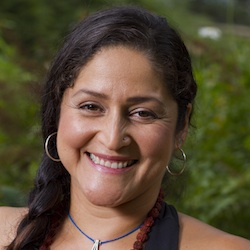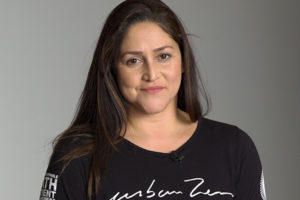Today SevenPonds speaks with Menna Olvera Feder, program director for the Urban Zen Integrative Therapy Program (UZIT). A yoga teacher and Urban Zen integrative therapist, Menna studied under Rodney Yee and Colleen Saidman Yee, who, along with designer and philanthropist Donna Karan, started the Urban Zen Foundation in 2009 following the death of Donna’s husband Stephan from cancer. The goal of the program is to provide an approach to healthcare that treats “the patient, not the disease” by integrating traditionally Eastern healing modalities with Western medicine.
Editor’s note: This interview has been edited for length and readability.

Credit: uwsyoga.com
Kathleen Clohessy: Hi Menna. Thanks for speaking with me today! Can I start out by asking you a little about your background and how you became involved with UZIT?
Menna Olvera Feder: I first heard about the idea in 2007, at a Well Being Initiative hosted by the Urban Zen folks. It was a 10-day conversation among patients, doctors, nurses, yoga instructors and various alternative healthcare practitioners about changing the paradigm of Western medicine to more holistic, patient-centered care. I wasn’t even a yoga teacher at the time, but I really wanted to be a part of what was happening there, so I began to study yoga. After receiving my certification, I applied to the UZIT program, but I wasn’t accepted the first time around. It actually took me about 4 years to get my foot in the door!
Kathleen: What exactly is Urban Zen Integrative Therapy?
Menna: Urban Zen Integrative Therapy is an approach to health care that integrates five healing modalities: yoga, essential oils, Reiki, nutrition and contemplative care. It’s practiced somewhat differently in hospitals and in the community. In hospitals, where it is used primarily to manage symptoms associated with serious illness, the modalities are often used together: for example, essential oils paired with Reiki or yoga. In the community, UZIT is more of a self-care model in which people are taught how to use UZIT techniques to better care for themselves and manage stress.
Kathleen: What sort of symptoms does UZIT address?
Menna: Urban Zen integrative therapy can help manage many symptoms of disease, but those we address most regularly are pain, anxiety, nausea, insomnia, constipation (PANIC ™) and exhaustion — all of which are very common symptoms of patients undergoing treatment for cancer and other life-limiting illnesses. We sequence the various modalities in very specific ways to address symptoms or groups of symptoms. For example, restorative yoga poses combined with essential oils can address both pain and constipation.
Kathleen: How can a seriously ill person practice yoga?
Menna: Obviously, a person who is hospitalized with a serious illness can’t get down on a yoga mat and do a downward dog! But there are many ways that UZIT therapists help patients to assume poses that restore and heal…positioning them properly and propping them up with pillows, for instance. We also teach a variety of breathing techniques that work to calm, restore, or energize the patient, depending on what the person needs at the time.
Kathleen: Do you use UZIT with patients only or is it helpful for caregivers as well?
Menna: UZIT isn’t exclusively for people who are ill…not at all. In the hospitals we partner with, caregivers receive training on not just on how to integrate the UZIT model into their patient care, but also how to use it to practice self care. In fact, self-care is one of the core tenets of the UZIT philosophy. You can’t fill a bucket from an empty well. In order to provide the best care for your patients, you need to care for yourself first,

Credit: urbanzen.org
Kathleen: Are you in partnership with many hospitals right now?
Menna: Yes! Our first pilot program was at Beth Israel Medical Center in 2008 on a 24-bed medical oncology unit. Beth Israel was bought by Mount Sinai Health Systems in 2013, so that program no longer exists. Nevertheless the results of our research were profound. For example, the data showed that UZIT saved about $500 in medication costs for each patient, or $156 per patient per day. That adds up to about $1 million in cost savings per year.
Based on that initial success, we were able to move on to other providers across the country, including UCLA Medical Center, Northwell Health’s gynecology oncology program, and several providers in the Chicago area. At UCLA alone we have trained over 300 doctors, nurses and staff in UZIT.
Kathleen: Do you work with other non-hospital care providers too?
Menna: Yes. One of our most exciting partnerships at the moment is with CareRite Centers, a healthcare company that buys and refurbishes nursing homes, turning them into high-end rehabilitation centers that provide immersive patient-centered care, primarily to the elderly. CareRite currently has 26 facilities across five states, and we are partnering with them in 10 of those locations, and will be in five more within the next six months.
Kathleen: Do you use UZIT for patients with dementia and/or those at the end of life?
Menna: Yes. And we are finding that the UZIT has a significant impact, especially in people with Alzheimer’s and dementia. The contemplative care aspect is also an important adjunct for people at the end of life. Our therapists support the patient during the dying process, sit vigil with the family and bear witness to the transition. It’s a very powerful tool.
This concludes part one of our interview with Menna Olivera Feder. Please come back next week to learn more about UZIT and the Urban Zen Foundation.

 What Is Urban Zen Integrative Therapy?
What Is Urban Zen Integrative Therapy?


 John Mulaney’s “Funeral Planning” on Netflix: No Real Plan
John Mulaney’s “Funeral Planning” on Netflix: No Real Plan

 Composting Bodies Is Now Legal in a Dozen States
Composting Bodies Is Now Legal in a Dozen States














